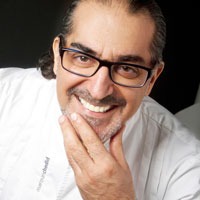< Read Before: AMFORHT’s Regional Expansion Invitation

MAROUN CHEDID’S COOKING ACADEMY PAYS IT FORWARD
Chef Maroun Chedid, founder of the Maroun Chedid Cooking Academy, speaks about the courses offered and the opportunities afforded to graduates seeking employment in the hospitality industry.
What are the programs on offer?
The Maroun Chedid Cooking Academy teaches new and budding chefs all the techniques and methods needed to work in the hospitality industry. The culinary arts program is broken down into four stages, beginning with basic, intermediate, advanced and technical. Each level comprises techniques and cooking methods encompassing Lebanese, as well as international cuisines, including pastry and bakery.
How do these differ from what is available and what are the requirements for enrolment?
Our classes and teaching methods are quite novel in the region as they combine both theory and practice. We also regularly invite international experts, hoteliers and world-renowned guest chefs to share their experience and talent, each within their respective fields, such as wine, cooking, coffee, single malts and table-setting. Professional chefs teach international cooking classes with a special holistic approach that covers every aspect, from the origin of the ingredients used to the cooking methods, divided into easy-to-follow, individual steps. We are also proud to be the only cooking academy that offers Lebanese cuisine cooking classes taught by professional chefs. Our curriculum is designed and tailored for Lebanese cuisine gastronomy education catering to chefs, professionals, amateurs and food enthusiasts alike.
What are the advantages for those who eventually attain a degree from your school?
The academy offers certificates of completion to students who have spent a specified amount of time working alongside Maroun Chedid. Those trained in the MC kitchens and under the MC standards, will benefit from the chef’s network of the best restaurants and hotels in the region for future work placements.
What kinds of skills do these programs focus on and how important is previous experience?
It depends on the levels. Basic levels do not require any previous training. However, passion and dedication to the culinary arts is a must on all levels!
Are these programs tailored to individual needs?
Despite the fact that we have a general curriculum, we nonetheless do offer customized classes for clients who require specific topics or special trainings. As for accommodating an existing need in the hospitality market, I would say that there is a huge gap in the region pertaining to finding capable chefs who are qualified in theory and practice. Furthermore, those who are do not necessarily have the leadership skills required to properly manage a team.
Upon graduation, will the candidates merit any special consideration pertaining to employment?
Our school works closely with the Maroun Chedid human resources department for employment within the region in various F&B, hotels and restaurants. As such, the courses and certificates offered also extend to services to support finding suitable outlets of employment.
What, in the near future, will be some of the most sought-after positions in the market?
The market strongly needs passionate and capable chefs in all positions, but mostly, there is a great need for good bakers.
Do you envision the emergence of any new hospitality positions that don’t yet exist?
In order to remain relevant and ahead of the curve, chefs will have to immerse themselves in the field of research and development. While this may prove challenging, considering the time restraints and long working hours, it remains a must. Furthermore, chefs will need to dedicate a portion of their free time to experimentation, taking a trial and error approach. They will also need to think out of the box by breaking the proverbial mold of the culinary rules in order to eventually create new dishes and flavors and, in so doing, set a new trend.

MAROUN CHEDID COOKING ACADEMY
Maroun Chedid
Founder
“In order to remain relevant and ahead of the curve, chefs will have to immerse themselves in the field of research and development”













